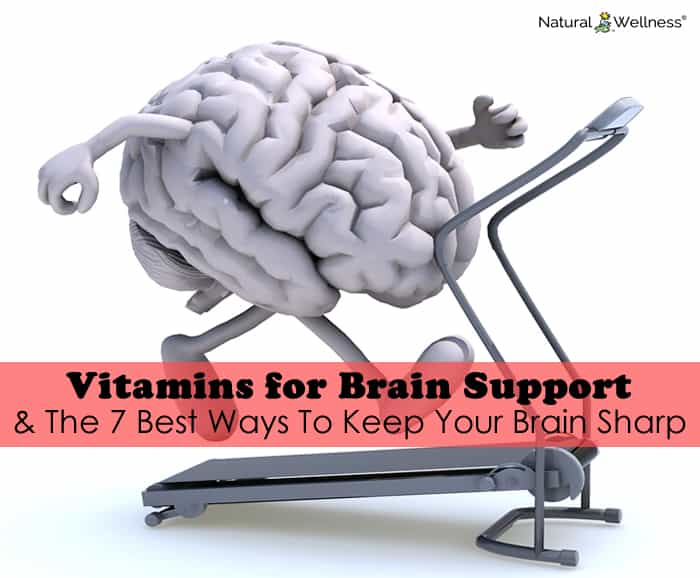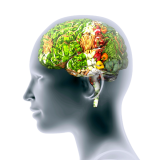

With so much relying on healthy brain function, knowing what vitamins bolster brain support is invaluable. And seeing as vitamins are organic compounds essential for normal physiological functioning, yet aren’t synthesized naturally by the body, not only can the right combination of vitamins potentially ward off cognitive disorders such as Alzheimer’s and dementia, but also get you thinking clearly and feeling sharper than ever.
DHA for Short
Docosahexaenoic acid, or DHA for short, is a nutrient and omega-3 fatty acid that is naturally occurring in breast milk and is essential to prenatal development and cognitive functionality. DHA accumulates in the brain and retina during pregnancy and through the first few years of life, playing a key role in neural and visual development.
While research is limited on DHA, a recent New York Times article quoted Dr. Steven Abrams, professor of pediatrics at Dell Medical School at the University of Texas at Austin in support of DHA as an additive to baby formula.
Beyond the first few years of life, it’s not a bad idea to incorporate DHA into your diet or supplement routines, but it’s hard to tell if DHA improves cognition from a scientific standpoint. Regardless, it certainly won’t hurt, and many experts recommend 200 milligrams of DHA per day, which equals 12 ounces of fish per week.
Supplements are another convenient and efficient way to get your daily dose of DHA. Many supplements that support brain function contain DHA and many contain additional vitamins and nutrients that support brain function.
Ginko Biloba

Ginko biloba has long been used by Chinese herbalists to fight depression, aid memory, and generally improve cognition. And, while the relationship with western medicine has been somewhat misunderstood, recent studies are showing the benefits.
One study found that “in a trial of 330 stroke patients over six months in China, the supplement was linked with better cognitive skill scores on tests.” While that sample feels somewhat limited, another placebo-controlled double-blind experiment study published by the Psychopharmacology, a German medical publication, found that ginko biloba, “significantly improved performance on the sustained-attention task and pattern-recognition memory task.”
One of the easiest ways to get your daily dose of ginko biloba is through some sort of dietary supplement, such as Natural Wellness’s Brain Support. However, consult your physician before taking ginko biloba, as it may interact negatively with other conditions you may have.
Vitamin E
Vitamin E is a powerful antioxidant that helps your body combat oxidative stress caused by free radicals and is widely believed to support brain function. An online publication called Nutrients looked at numerous studies and experiments conducted over the last 30 years and found that the “epidemiological studies demonstrate that consumption of specific micronutrients, including vitamin E, is linked to improved cognitive performance in humans.”
B Vitamins
The B vitamins include thiamine (B1), riboflavin (B2), niacin (B3), pantothenic acid (B5), vitamin B6, folate (B9) and vitamin (B12).
A particular few play crucial roles in cognition:
- B12 is crucial for memory function, and a deficiency of it is associated with increased risk of dementia and memory loss, according to the Mayo Clinic. B12 is found naturally in meats and poultry as well as fish. Vegetarians beware – along with the elderly – you are particularly at risk and should consider a B12 supplement to get the recommended daily dose of 2.4 micrograms.
- B6 is integral to a healthy mood and aids in the production of neurotransmitters which carry messages from the brain to the rest of your body. Incorporating B6 into your diet can be as simple as eating more fish, fortified breakfast cereal, or a cup of chickpeas, all of which are high in B6.
Vitamin D
Getting enough vitamin D is important in regulating cell growth and is integral to maintaining your immune system. Some studies indicate low levels of vitamin D are associated with depressive symptoms across genders.
Avoid deficiency by eating foods rich in vitamin D such as:
- Mushrooms
- Milk
- Various types of fish
- As well as getting enough sunlight

However, if you live in a place where access to those foods is limited or the season prohibits receiving natural vitamin D through sunlight, a vitamin D supplement is the answer.
Curcumin and Turmeric
The spice turmeric is filled with the antioxidant curcumin, and has a brilliant orange color. Gary Small, M.D., director of geriatric psychology at UCLA’s Longevity Center, says, “we think it’s one of the reasons that senior citizens in India, who eat curcumin virtually every day, have a lower prevalence of Alzheimer’s disease.”
If you don’t want to eat the spice, simply take a turmeric supplement high in curcumin to get your daily dose. But, we recommend you consume it with fats or oils to increase its absorption.
7 Tips to Improve Your Brain Function
While vitamins are a great way to support healthy brain function, they’re not the only way to keep your brain healthy and working in your favor.

Below are the 7 most crucial steps you can take to improve your brain function and overall cognition.
- Get Better Sleep: The RAND research group recently released a 100-page analysis on sleep and sleep deprivation’s effects on us. They found that sleep helps solidify long-term memory and can have a direct impact on cognition, decision making, creativity, and cognitive disorders like depression.
- Good Ol’ Fashion Exercise: That whole mind-body connection thing, it’s real. Not only does exercise promote vitality and a healthy central nervous system, evidence shows that there is a direct connection between physical exercise and mental health in humans. Furthermore, not getting enough exercise is tied to many metabolic disorders and can be a starting point for numerous neurological disorders that may cause a prolonged hindrance to cognitive function.
- Intelligence and Learning: According to Harvard Health Publishing at Harvard University, higher levels of education are associated with strong mental function in old age. Keeping the mind active is the same as keeping any other muscle strong in order to ward off atrophy.
- Stop Smoking and Drinking: If you’re not convinced by the mountains of evidence proving smoking is bad for you, maybe this will tip the scale. A French study published in the Journal of Sciences found that nicotine kills brain cells in lab rats and also affects reward centers in the brain. On the short term, drinking impairs cognition causing those who drink to lose their ability to think responsibly. Long-term drinking literally leads to diminished grey matter in the brain, memory loss, and loss of attention span.
- Sense it or Lose it: In essence, using all of your senses in trying to retain memories forms stronger connections by including more areas of the brain. Associating a sound or a smell can heighten a memory and form wider reaching neurological pathways that improve your chance of recalling memories later.
- Repetition, Repetition, Repetition: Repetition can help cement things in your mind. Repeating a new name or fact back to ourselves, out loud or internally, can dramatically increase recall.
- Clean Diet: In thinking about the best foods to eat for brain support, the Mediterranean Diet always comes to mind. More research is needed, but the Mediterranean Diet is rich in omega-3 fatty acids, which protect neurons against damage and have been proven to reduce oxidative damage in lab rats as well as help to counteract learning disabilities following traumatic brain injury.
Brain Support in a Nutshell
In taking a holistic approach to healthy brain function it’s important to include a comprehensive vitamin regimen alongside healthy eating habits and behaviors. Hopefully, the nutritional and behavioral information above can be used to in tandem to create well-rounded approaches to bolster brain support.




